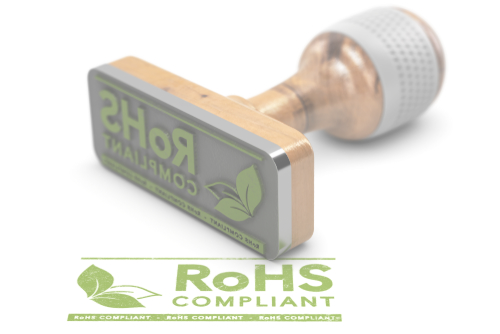Materials Compliance

RoHS Compliant
In response to the environmental protection directives of the world, Hunston implements some internal policies to promote product compliance. One of the directives is RoHS (Restriction of the use of certain Hazardous Substances).
The updated directive of RoHS (EU) 2015/863 includes 10 restricted substances, and the RoHS legislation restricts the use of the following potentially hazardous substances:
- Cadmium (Cd): < 100 ppm (0.01%)
- Lead (Pb): < 1000 ppm (0.1%)
- Mercury (Hg): < 1000 ppm (0.1%)
- Hexavalent Chromium (Cr VI) < 1000 ppm (0.1%)
- Polybrominated Biphenyls (PBB): < 1000 ppm (0.1%)
- Polybrominated Diphenyl Ethers (PBDE): < 1000 ppm (0.1%)
- Bis(2-Ethylhexyl) phthalate (DEHP): < 1000 ppm (0.1%)
- Benzyl butyl phthalate (BBP): < 1000 ppm (0.1%)
- Dibutyl phthalate (DBP): < 1000 ppm (0.1%)
- Diisobutyl phthalate (DIBP): < 1000 ppm (0.1%)
RoHS limits these substances to 0.1% or 1,000 ppm (except for cadmium, which is limited to 0.01% or 100 ppm) by weight of homogenous material.
All Hunston products follow the RoHS compliant to support lead-free solder processes.
The related RoHS information, including RoHS certification of compliance, is available on our website.
For further information about RoHS, please directly to contact us to get the test report from a professional inspection company.
EU REACH Compliance
In response to REACH regulation, Hunston always controls our suppliers have confirmed that the necessary raw materials will be available under REACH.
The Registration, Evaluation, Authorization, and Restriction of Chemicals (1907/2006/EC (REACH)) Regulation is a European Community Regulation on chemicals and their safe use and entered into force on 1st June 2007. This regulation improves the protection of human health and the environment through the better and earlier identification of the intrinsic properties of chemical substances.
For potentially hazardous substances to be in the scope of REACH, they must first be identified as Substances of Very High Concern (SVHC) by the European Chemicals Agency (ECHA). At the request of member states or the European Commission. Once a substance is confirmed as an SVHC, it is added to the Candidate List, which contains substances whose priority is determined by the ECHA for possible inclusion on the Authorization List.
The Authorization List restricts the use of certain substances in the European Union without authorization from the ECHA.
Certain substances are restricted from being manufactured, marketed, or used across the EU by REACH Annex XVII, also known as the restricted substances list, whether authorized or not. This is because these substances are deemed to pose a substantial risk to human health and the environment. Please check more detail about EU REACH on the ECHA website.
The related REACH information, including REACH compliance certification, is available on our website.
For further information about REACH, please get in touch with your representative sales or contact us to get the test report from a professional inspection company.
Non-Conflict Minerals Policy
Armed rebel organizations in the Democratic Republic of the Congo (DRC) and surrounding nations operate through metal mining and trading and cause many social and environmental problems, including human rights violations, armed conflict, and international disputes.
The minerals are tantalum (Ta), tin (Sn), tungsten (W), and gold (Au), also known as the 3T's and gold (3TG). 3TG derived from DRC and neighboring conflict areas are called conflict minerals. In the DRC, many sources of the 3TGs are controlled by armed groups that have conducted severe human rights violations.
As a corporate citizen responsible for protecting human rights and ethical business practices and ameliorating armed conflicts in DRC and neighboring nations, Hunston is committed to demanding that our suppliers never use conflict metals from the conflict areas. Please immediately notify us when conflict minerals are found to have been unintentionally used in our products so that we may adopt the necessary measures.
We also declare our non-conflict minerals policy on our official website. We never purchase conflict metals produced from DRC or neighboring nations to demonstrate our dedication to social responsibility. We will also do our best to investigate our suppliers' metal sources. We adopt CFSI's Conflict Minerals Reporting Template (CMRT) for our investigations to ensure that Hunston and its suppliers obtain raw materials from areas other than the conflict regions and adhere to the customer and regulatory requirements.
We reserve the right to change or modify any terms and conditions contained in the non-conflict minerals policy at our sole discretion without any notification.
For any questions or comments about the non-conflict minerals policy, please directly to contact us.


